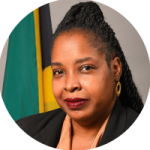

Article of the Month - April 2024 |
FIG Working Week 2023 took place in Orlando, Florida, 28-May - 1 June 2023. Each day a plenary session started the day with high level presentations ot topics under the main conference theme: "Protecting our World, Conquering New Frontiers"
We are excited to present to you in our "Video of the Month Series", these two recording under the headline: Tackling the Global Challenges.
Surveyors have much to contribute in society and to highlight, advocate and above all act to ensure change that builds on a sustainability agenda. These two keynote presentation elaborate on selected challenges that is at the forefront of thinking and highlighted in some of the FIG commission working groups. Driven by the need for sustainable development and fit for the future, this includes: an introduction to the new Reference Frame system/Datum that is being introduced in the US and which is leading up to a special National Geodetic Survey Day/Track (NGS); and Disaster responsiveness highlighting the sustainability of island states given the challenges that the Small Islands are facing.
 |
Keynote presentation by
|
The Theme for this Working Week is "Protecting Our World, Conquering New Frontiers." To achieve this, geospatial data from many different sources must be interoperable and defined within a modern, accurate, inclusive reference frame. The National Oceanic and Atmospheric Administration’s (NOAA) mission to understand and predict changes in climate, weather, ocean and coasts also includes a mandate to define, maintain and provide access to the National Spatial Reference System (NSRS). Tracing roots back to the first federal scientific agency in the United States, NOAA's National Geodetic Survey (NGS) enables mapping and charting and provides the framework for positioning in the U.S. through the NSRS. The NSRS modernization, underway for a decade and nearly complete, will align the critical U.S. geospatial data assets within global data inventories and enable improved analysis and modeling of climate changes and impacts to society and the environment. The modernized NSRS enables data integration of new and old technologies, adopts modern standards and empowers growth in new fields and applications.
Juliana oversees the management and delivery of the National Spatial Reference System, the nation’s consistent coordinate system for latitude, longitude, height, gravity measurements and shoreline. Ms. Blackwell serves as Chair of the Federal Geodetic Control Subcommittee of the Federal Geographic Data Committee, exercising government-wide leadership in the development and improvement of geodetic surveying specifications, methods, instrumentation, and data transfers. She is a member of NOAA’s Hydrographic Services Review Panel, a federal advisory committee providing advice to the NOAA Administrator on matters related to hydrographic services. She represents NOAA on the interagency Alaska Mapping Executive Committee and the 3D Elevation Program Executive Forum and serves as Vice Chair of the Civil Applications Committee.
 |
Keynote presentation by
|
Simone is an internationally certified geospatial professional (GISP), project manager, educator and trainer with a wealth of over 15 years’ experience contributing to the development of Jamaica’s geospatial landscape. She currently serves as the Acting Principal Director within the National Spatial Data Management Branch of Jamaica's Ministry of Economic Growth & Job Creation. Her main responsibilities include directing daily operations, coordinating national geospatial projects, policies, events, training and education initiatives and programmes, including coordinating the National Emergency Response GIS Team (NERGIST). She currently serves as Jamaica’s Focal Point and Head of Delegation to the United Nations Global Geospatial Information Management (UN-GGIM) Group of Experts and its Americas Regional Committee and Caribbean Vocal to the UN-GGIM